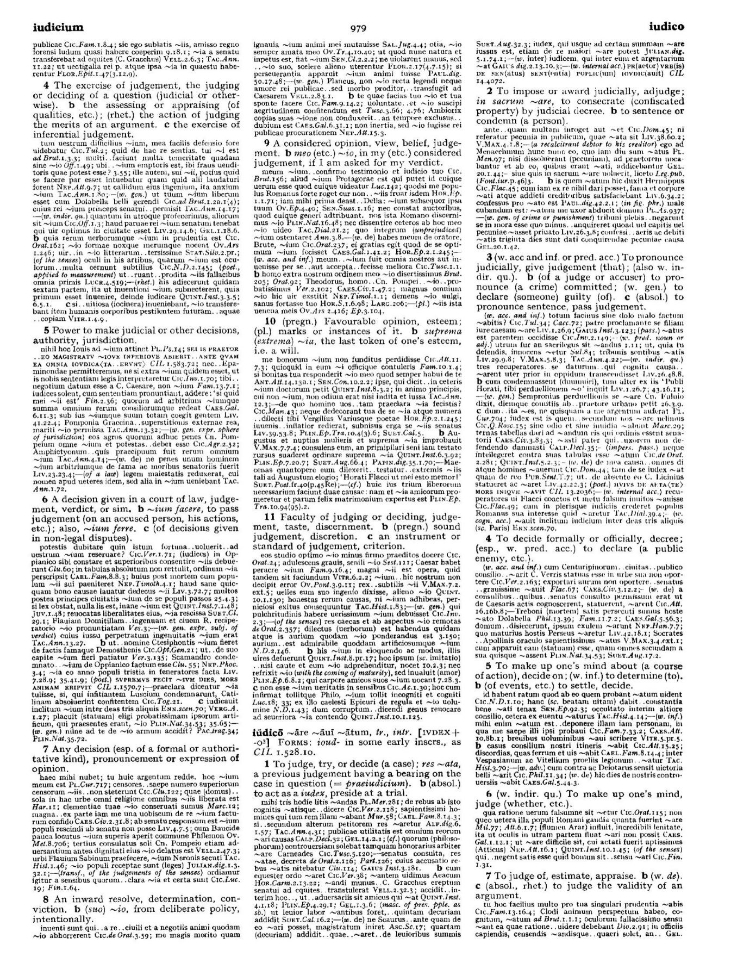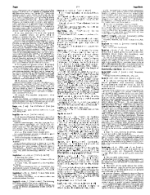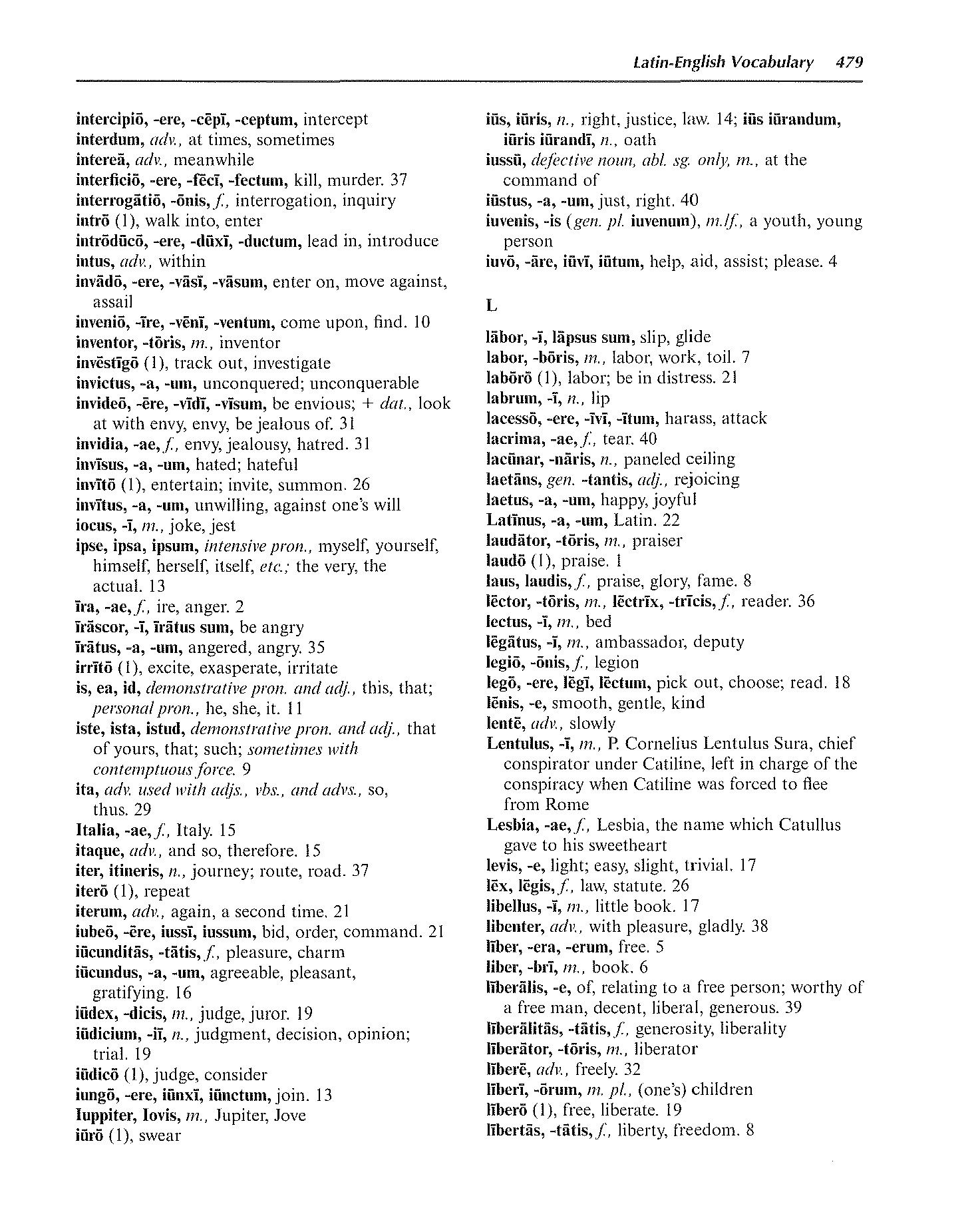
page_listing.tpl
page_subListingDetails.tpl
sub_listingDetails_style1.tpl
sub_listingDetails.title.tpl
iūdicāre to judge
iūdicāre is a Latin Verb that primarily means to judge.
Definitions for iūdicāre
Wheelock's Latin
Verb
- 1
judge, consider
Oxford Latin Dictionary
Verb
- 1
To judge, try, or decide (a case); re ~ata, a previous judgement having a bearing on the case in question (=praeiudicium). (b) (absol.) to act as a iudex, preside at a trial.
- 2
To impose or award judicially, adjudge; in sacrum ~are, to consecrate (confiscated property) by judicial decree. (b) to sentence or condemn (a person).
- 3
(w. acc and inf. or pred. acc.) To pronounce judicially, give judgment (that); (also w. indir. qu.). (b) (of a judge or accuser) to pronounce (a crime) committed; (w. gen.) to declare (someone) guilty (of). (c) (absol.) to pronounce sentence, pass judgement.
- 4
To decide formally or officially, decree; (esp., w. pred. acc.) to declare (a public enemy, etc.).
- 5
To make up one's mind about (a course of action), decide on; (w. inf.) to determine (to). (b) (of events, etc.) to settle, decide.
Sentences with iūdicāre
Latin to English
Ira id aequum videti vult quod iudicavit.Compare Anger wishes the decision it has given to seem the just decision.
Ratio id iudicare vult quod aequum est.Compare Reason wishes the decision it gives to be just.
Ipse iudico homo tu gratus benigne facio.Compare You yourself shall decide that you have acted kindly to a very grateful man.
Inexcusabilis est omnis peccator vel reatu originis vel additamento etiam propriae voluntatis, sive qui novit sive qui ignorat, sive qui iudicat sive qui non iudicat; quia et ipsa ignorantia in iis, qui intelligere noluerunt, sine dubitatione peccatum est, in iis autem qui non potuerunt, poena peccati.Compare Every sinner is inexcusable, whether because of the original sin or because of an additional offense due to his own will, whether he knows or does not know it, whether he condemns or does not condemn it; because in those unwilling to understand ignorance itself is beyond doubt a sin, and in those unable to understand, this inability is the penalty of sin.
Conjugation table for iūdicāre
Cactus2000
| ACTIVE | |
| Indicative present | Indicative imperfect |
| iūdicō iūdicās iūdicat iūdicāmus iūdicātis iūdicant | iūdicābam iūdicābās iūdicābat iūdicābāmus iūdicābātis iūdicābant |
| Indicative perfect | Indicative pluperfect |
| iūdicāvī iūdicāvistī iūdicāvit iūdicāvimus iūdicāvistis iūdicāvērunt / iūdicāvēre | iūdicāveram iūdicāverās iūdicāverat iūdicāverāmus iūdicāverātis iūdicāverant |
| Indicative future | Indicative future perfect |
| iūdicābō iūdicābis iūdicābit iūdicābimus iūdicābitis iūdicābunt | iūdicāverō iūdicāveris iūdicāverit iūdicāverimus iūdicāveritis iūdicāverint |
| Subjunctive present | Subjunctive imperfect |
| iūdicem iūdicēs iūdicet iūdicēmus iūdicētis iūdicent | iūdicārem iūdicārēs iūdicāret iūdicārēmus iūdicārētis iūdicārent |
| Subjunctive perfect | Subjunctive pluperfect |
| iūdicāverim iūdicāveris iūdicāverit iūdicāverimus iūdicāveritis iūdicāverint | iūdicāvissem iūdicāvissēs iūdicāvisset iūdicāvissēmus iūdicāvissētis iūdicāvissent |
Infinitive present iūdicāre Infinitive perfect iūdicāvisse Infinitive future iūdicātūrum esse | Imperative present iūdicā iūdicāte Imperative future iūdicātō iūdicātō iūdicātōte iūdicantō |
| PASSIVE | |
| Indicative present | Indicative imperfect |
| iūdicor iūdicāris iūdicātur iūdicāmur iūdicāminī iūdicantur | iūdicābar iūdicābāris / iūdicābāre iūdicābātur iūdicābāmur iūdicābāminī iūdicābantur |
| Indicative perfect | Indicative pluperfect |
| iūdicātus sum iūdicātus es iūdicātus est iūdicātī sumus iūdicātī estis iūdicātī sunt | iūdicātus eram iūdicātus erās iūdicātus erat iūdicātī erāmus iūdicātī erātis iūdicātī erant |
| Indicative future | Indicative future perfect |
| iūdicābor iūdicāberis / iūdicābere iūdicābitur iūdicābimur iūdicābiminī iūdicābuntur | iūdicātus erō iūdicātus eris iūdicātus erit iūdicātī erimus iūdicātī eritis iūdicātī erunt |
| Subjunctive present | Subjunctive imperfect |
| iūdicer iūdicēris / iūdicēre iūdicētur iūdicēmur iūdicēminī iūdicentur | iūdicārer iūdicārēris / iūdicārēre iūdicārētur iūdicārēmur iūdicārēminī iūdicārentur |
| Subjunctive perfect | Subjunctive pluperfect |
| iūdicātus sim iūdicātus sīs iūdicātus sit iūdicātī sīmus iūdicātī sītis iūdicātī sint | iūdicātus essem iūdicātus essēs iūdicātus esset iūdicātī essēmus iūdicātī essētis iūdicātī essent |
Infinitive present iūdicārī Infinitive perfect iūdicātum esse Infinitive future iūdicātum īrī | Imperative present iūdicāre iūdicāminī Imperative future iūdicātor iūdicātor - iūdicāntor |
| PARTICIPLE | ||
| Participle present active | ||
| Nom. | iūdicāns | iūdicantēs |
| Gen. | iūdicantis | iūdicantium |
| Dat. | iūdicantī | iūdicantibus |
| Acc. | iūdicantem | iūdicantēs |
| Abl. | iūdicante | iūdicantibus |
| Participle future active | ||
| Nom. | iūdicātūrus | iūdicātūrī |
| Gen. | iūdicātūrī | iūdicātūrōrum |
| Dat. | iūdicātūrō | iūdicātūrīs |
| Acc. | iūdicātūrum | iūdicātūrōs |
| Abl. | iūdicātūrō | iūdicātūrīs |
| Participle perfect passive | ||
| Nom. | iūdicātus | iūdicātī |
| Gen. | iūdicātī | iūdicātōrum |
| Dat. | iūdicātō | iūdicātīs |
| Acc. | iūdicātum | iūdicātōs |
| Abl. | iūdicātō | iūdicātīs |
| Gerundive | ||
| Nom. | iūdicandus | iūdicandī |
| Gen. | iūdicandī | iūdicandōrum |
| Dat. | iūdicandō | iūdicandīs |
| Acc. | iūdicandum | iūdicandōs |
| Abl. | iūdicandō | iūdicandīs |
| Gerund | Supine | |
| Nom. | iūdicāre | iūdicātum |
| Gen. | iūdicandī | iūdicātū |
| Dat. | iūdicandō | |
| Acc. | iūdicandum | |
| Abl. | iūdicandō | |
Data sources
Notes
- Definitions
- Frederick M. Wheelock, Wheelock's Latin, 6th ed., rev. Richard A. LaFleur (New York, NY: HarperCollins Publishers, 2005): 479.
- P. G. W. Glare, Oxford Latin Dictionary, Vols. 1-8 (Oxford: Clarendon Press, 1982): 979.
- Word frequencies
- Christopher Francese, "Latin Core Vocabulary," Dickinson College Commentaries, last modified 2014, http://dcc.dickinson.edu.
- Paul B. Diederich, The Frequency of Latin Words and Their Endings, PhD diss., (Columbia University, 1939).
- Louis Delatte, Suzanne Govaerts, Joseph Denooz, and Etienne Evrard, Dictionnaire fréquentiel et index inverse de la langue latine [Frequency Dictionary and Inverse Index of the Latin Language] (Liège, Belgium: Laboratoire d'analyse statistique des langues anciennes de l'Université de Liège [L.A.S.L.A.], 1981): 121.
Bibliography
Allen, Joseph H. Allen and Greenough's New Latin Grammar for Schools and Colleges: Founded on Comparative Grammar. Edited by James B. Greenough, George L. Kittredge, Albert A. Howard, and Benjamin L. D'Ooge. Boston, MA: Ginn & Company, 1903.
Crystal, David. A Dictionary of Linguistics and Phonetics. 6th ed. Oxford, UK: Blackwell Publishing, 2008.
Delatte, Louis, Suzanne Govaerts, Joseph Denooz, and Etienne Evrard. Dictionnaire fréquentiel et index inverse de la langue latine [Frequency Dictionary and Inverse Index of the Latin Language]. Liège, Belgium: Laboratoire d'analyse statistique des langues anciennes de l'Université de Liège (L.A.S.L.A.), 1981.
Diederich, Paul B. The Frequency of Latin Words and Their Endings. PhD diss., Columbia University, 1939.
Francese, Christopher. "Latin Core Vocabulary." Dickinson College Commentaries. Last modified 2014. http://dcc.dickinson.edu/latin-vocabulary-list.
Gildersleeve, Basil L., and Gonzales Lodge. Gildersleeve's Latin Grammar: Third Edition, Revised, and Enlarged. 3rd ed. London, England: Macmillan and Co., 1903.
Glare, Peter G.W. Oxford Latin Dictionary. Vols. 1-8. Oxford, England: Clarendon Press, 1982.
Krüger, Bernd. "Latin Conjugation Tables." Cactus2000. Accessed May 5, 2023. https://latin.cactus2000.de/index.en.php.
Pierson, Nick. "Sound of Text." Accessed October 26, 2019. https://soundoftext.com.
Wheelock, Frederick M. Wheelock's Latin. 6th ed. Revised by Richard A. LaFleur. New York, NY: HarperCollins Publishers, 2005.
Wiktionary Contributors. "Victionarium." Wikimedia Foundation, Inc. Updated March 18, 2019. https://la.wiktionary.org/wiki/Victionarium:Pagina_prima.
Citation
Chicago (17th ed.)
Allo Contributors. "iūdicō, iūdicāre, iūdicāvī, iūdicātum (v.) - Latin Word Definition." Allo Latin Dictionary. Last modified . Accessed February 20, 2026. http://ancientlanguages.org/latin/dictionary/iudico-iudicare-iudicavi-iudicatum.
Entry created on . Last updated on .








